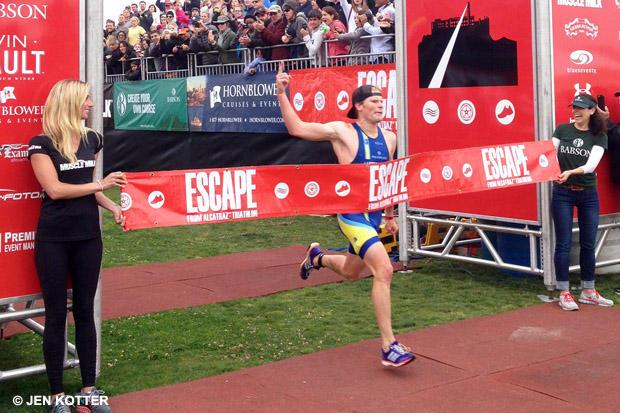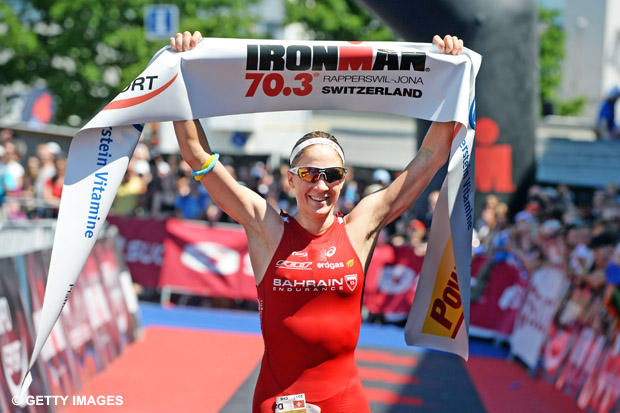The passionate Andrew Duggan
Andrew Duggan is passionate about triathlon and races and trains like many other age groupers and just earned a Kona slot. He also passionately supports several pro triathletes through his Equal Earth solar brand and we had a few words with him.
Slowtwitch: Thank you for your time Andrew.
Andrew Duggan: It’s my pleasure Herbert and it was kind of you to ask. I appreciate what you do at Slowtwitch and truly enjoy reading your race summaries on a Sunday evening. It’s a great way to stay on top of the fast moving world of triathlon and a great timesaver for me.
ST: Time is indeed a very valuable commodity for most people these days and I would suspect it is very much true for you too.
Andrew: I’m sure I’m as a challenged as any other middle-aged age grouper. I’m married to an amazingly supportive woman, Dani; father of 3 teenage kids, each with their own unique needs; and running a growing solar financing business. It’s hard for anyone to be dedicated to their family, earn a living and train for the Ironman distance. I have huge amounts of respect for my fellow competitors on race day. I know what it takes just to get to the start line.
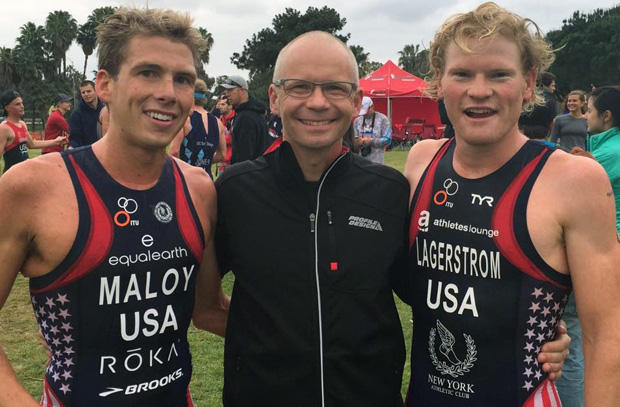
ST: Talk about your job.
Andrew: I run a solar financing company called Equal Earth. We provide solar systems to homes, business and government organizations throughout the US and are currently expanding overseas. Our goal is to help customers gain energy independence and reduce or eliminate their expensive utility bills. When you help people save money and you’re helping the planet at the same time – it’s hard not to love your job.
ST: I first noticed Equal Earth on the cycling kit of Eric Lagerstrom. But he is not the only athlete your company supports.
Andrew: Yeah. Eric is a rock star. What amazes me is that he is a rock star on a team of rock stars. We support the Triathlon Squad run by probably the best coach in the sport, Paulo Sousa, in San Diego. We also individually support many of the athletes on Paulo’s team and others. Such as Olympic hopeful Joe Maloy, the2014 USA Elite National Champion, Summer Cook who just made her debut in WTS racing and was first out of the water in Yokohama, Magali Tisseyre who I believe will win 70.3 Worlds, Chris Ganter who is a regular podium finisher in XTERRA events, Jen Spieldenner who swims faster than I can run and Ritchie Nichols who runs a 1:10-1:12 off the bike on any given 70.3.
We also support an amateur (Age Group) team, TriBy3, out of Brooklyn run by professional triathlete Greg Close. I’m a member of the Development Team on that squad. Greg is probably the best AG coach in the US – he had three athletes racing in Ironman Texas and they’re all going to Kona this year.
ST: When some of your athletes compete head-to-head, how do you decide whom to cheer for?
Andrew: That has happened. At the Tritonman Triathlon earlier this year it came down to a head-to-head contest between Joe Maloy and Eric Lagerstrom on the run. Joe had a slight lead on Eric shortly into the run – I was screaming for Joe to push harder when he came by and then shouting at Eric to catch Joe when he went by. All you can do is wish for them to do the best they can – which, for these guys, is something else.
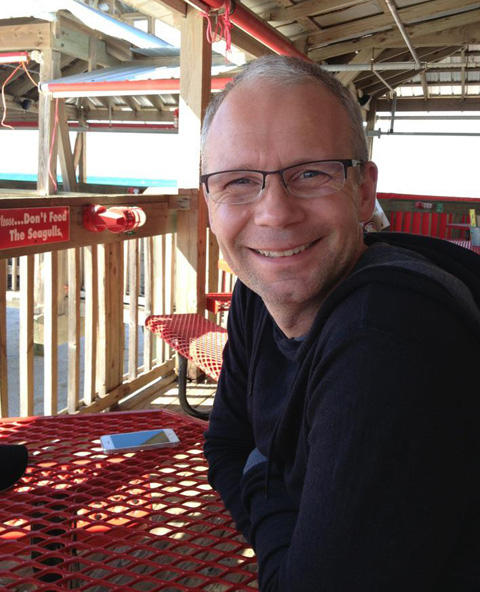
ST: You are fairly outspoken about the lack of support for professional triathletes. Can you elaborate about that topic?
Andrew: Tough topic for me Herbert! I’m a big sports fan but I recognize that some sports such as soccer, baseball, basketball and so forth are for entertainment, while others such as half marathons, marathons and triathlon are for participation. I also recognize that entertainment sports carry massive economic incentives for the best athletes – such as Messi in soccer to LeBron in basketball.
But I don’t see thousands of athletes getting up at the crack of dawn to play a game of soccer or shoot hoops. I do see 20,000 athletes line up for a marathon at 6am or 3,000 athletes put on wetsuits and get ready for a 2.4 mile swim. Our sport has more participation value than entertainment value – hence the difference in earning potential.
But surely, seeing an Olympic contender racing Javier Gomez on a borrowed bike, or a world champion contender sleeping on a blow-up mattress is simply insane. I can’t change how sponsors see our sport and the prize money that professionals can earn – but I do think that we need professionals to show us how great our sport can be.
The amount of training they put in on a daily basis, their commitment and talent, simply blows me away. We must provide economic support to the professionals in our triathlon for our sport to evolve and grow. All I can do right now is help those I know personally – which is what I’m doing. I encourage others to do the same.
ST: I know you are passionate about triathlon, but how hard of a sell was this sponsorship to other folks at Equal Earth?
Andrew: Well, pretty insightful question. It was a hard sell. We don’t sell wetsuits, or bikes or any product directly related to the sport of triathlon. But we do sell a better life and a better future. And supporting people who dedicate their lives to excellence and accomplish extraordinary results is a core part of the belief system of everyone in Equal Earth – so, when I put it that way, it was done.
ST: You said that you also encourage others to step up and help those they know. Have you had success along those lines?
Andrew: It’s a slow road unfortunately. I’d like to put more effort into this side of the sport, but I’d need to get Equal Earth to the next level first.
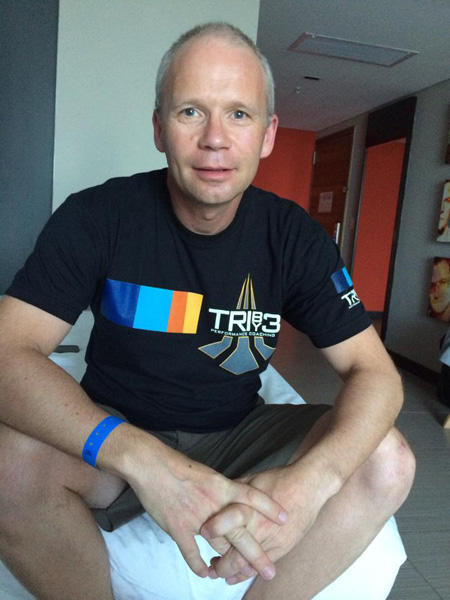
ST: My background is actually in marketing and I often give pros the advice that when traveling by plane they ought to not just put on a headset and hide in a book or a computer, but they should always make the attempt to meet the folks next to them. After all it could be a potential sponsor sitting next to them. What are your thoughts along those lines and what advice do you have for professional athletes in the triathlon world?
Andrew: In my view, the pros in triathlon are some of the best athletes in the world. Hands down. It seems to me that they are not well known – even within the triathlon age group community. This is going to sound ridiculous – but I didn’t know who Javier Gomez was two years ago. I was standing next to him at Baggage Claim in Panama when I was there to do the 70.3 in early 2014 – and I didn’t have a clue who he was. It wasn’t until I discovered Triathlon TV that I started to get to know the names, and reading race summaries on Slowtwitch!
So, I applaud live TV coverage (such as live coverage of Escape From Alcatraz) because it’s a game changer. But the onus is on the pro to create a fan base and they can’t be shy about it. Take a page out of Mo Farah’s book – that guy posts videos of him doing training runs in Africa, and getting dressed up for a night out in London. He even has creative hashtags that are awesome – such as #onemomile. He’s done a great job creating an online personality that draws people in and its very impressive. Dwayne “The Rock” Johnson almost posts his entire life online. And that’s the price, I think, for building a base of support, which inevitably leads to income in the world of professional sports. It’s about moving the dial from participation to entertainment.
A ground-breaking move in our sport is Eric Lagerstrom taking race videos and posting them online with full commentary. In my mind, it’s a genius move and he’s creating a base of support of people waiting for the next installment. I’ve noticed that Andy Potts is now releasing mini motivational videos. These are brilliant moves and we need more of it.
ST: What is next for the company?
Andrew: We’re growing pretty rapidly and I hope to be in a position to take Equal Earth public in the future. Let’s see.
ST: In other countries and especially in Germany solar power appears to be very popular, partly because of governmental subsidies. Why does it seem not so widespread here?
Andrew: We have excellent subsidies here in the US as well. Consequently our business is booming and solar penetration in the US is skyrocketing. It’s a good time to be in solar.
ST: How did you get started with triathlon?
Andrew: I remember watching Ironman on TV in Ireland when I was a kid. I remember thinking, those guys are nuts. But I sure would like to be strong enough to do one of those races some day.
Many years later in San Diego I noticed an ad for the Mission Bay sprint triathlon. I bought a cheap bike and headed down to the race. My swim was embarrassing, I couldn’t ride a bike to save me life – but when I got off the bike to run, something clicked and I’ve never looked back.
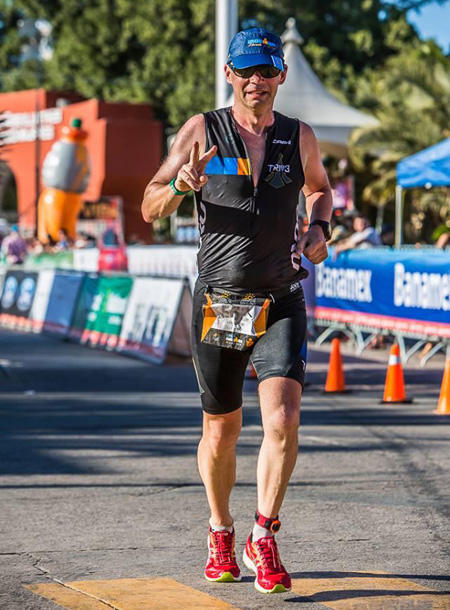
ST: How long ago was that?
Andrew: That was about 10 years ago – when I was in my mid 30’s. I messed around for a few years doing half marathons, marathon and sprint triathlons. I didn’t get serious about Ironman until 2011 when I met Greg Close and hired him as my coach.
ST: How much training do you get in during a week and how do you schedule those workouts?
Andrew: I do all my workouts early in the morning. If put a workout in for later in the day, work always gets in the way and it never gets done. All my long rides are over by 11am on Saturday so I can spend the day with my family. If I can get 14 hours a week, I’d be lucky.
ST: Of the 3 sports, which one would you consider to be your strongest one?
Andrew: I love running. I try and tell myself it is my best discipline – but my results tell me it’s my bike. I normally come of out of the water in the middle of the pack, but I’m always in the hunt when I get off the bike.
ST: What kind of bike do you race on?
Andrew: I ride a Guru .901. Complete with custom Equal Earth color scheme, logo and special Equal Earth decals on the wheels. I like my bike!
ST: Did anyone help you with the fitting?
Andrew: I work with master fitter Jonathan Blyer from Acme Bicycles out of Brooklyn. It’s always a tug of war with me wanting a more aero fit and he persuading me that I need to run a marathon after the bike is over. I think he’s winning.
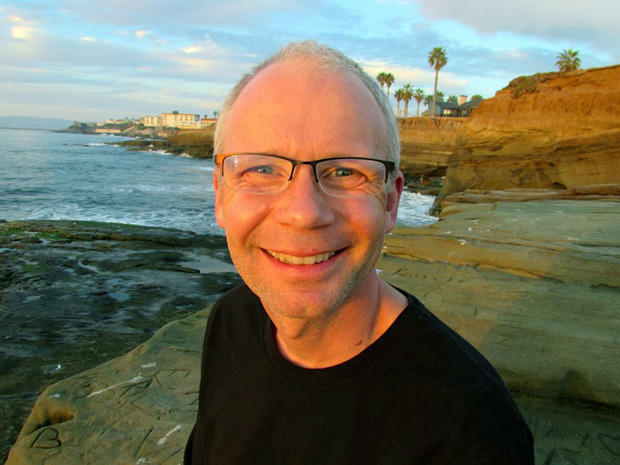
ST: You got your Kona slot in Texas. Happy?
Andrew: That brought a smile to my face. I knew starting the run that I had it in the bag – I was more afraid of doing something stupid and passing out with heat exhaustion mid way through the run. The feeling running down the chute was worth all the hard work and pain. It was easily worth it.
ST: Have you been to Kona to watch the race up close?
Andrew: Yes. I went in 2014 to support a close friend of mine. It was an incredible feeling and a party all rolled into one. I can’t wait to cross the finish line on Ali’i Drive!
ST: Does that mean after you competed in Kona you can be done with swimming, biking and running?
Andrew: Gosh no. I’ve only been in the sport about 4-5 years. I’m just getting started!
ST: What other interests do you have?
Andrew: Traveling. I love to travel. The whole family is taking a month in European going to the major cities so the kids can get to see a lot of the cities I saw when I was growing up. Oh, and we’ll stop in Roth so I can race Challenge Roth.
ST: I shall see you then. I am also headed to Roth, but to cover this race.
Andrew: Beers are on me! See you there!
ST: Oh, one more thing. There are pictures of you surrounded by lions and other wildcats. Is that another hobby of yours?
Andrew: I raced Ironman South Africa in 2013. It was an incredible experience. I took my family on a Safari in Kruger National Park after the race. It was a life changing experience for the whole family. I couldn’t resist the opportunity to pet the big cats.
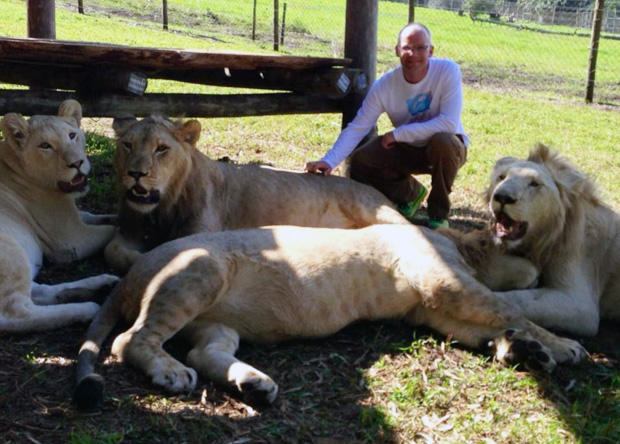
ST: Is there anything else we should know?
Andrew: Watch the Triathlon Squad. You’ll see some amazing things from the team from Powadise.
You can learn more about Equal Earth here.


